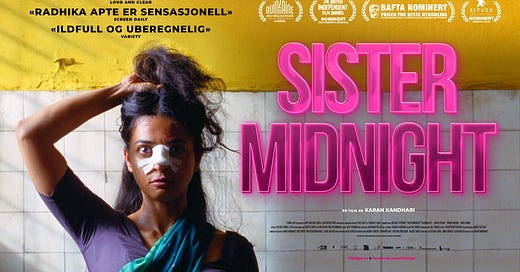A newlywed woman struggles to settle into her new life and embarks on an existential journey unlike any other in this delightful, distinctive, and refreshingly different Indian comedy-drama.
Directed by British-Indian filmmaker Karan Kandhari, it's striking to realize that Sister Midnight is only his second feature film. With his unique direction, a peculiar storyline, and a main character who will linger in your memory, Kandhari clearly paves his own cinematic path. He proves himself to be a director truly worth noticing and following in the years to come.
The story of Uma is that of a young woman who has recently been placed in a tiny shack of a house, right in the heart of Mumbai, with the man she has been forcibly married to. The latter is a lethargic and unmotivated figure who mostly just works and barely provides any companionship.
As her frustration grows day by day, she begins to transform into a kind of terrifying creature she herself struggles to understand. It becomes increasingly clear that she needs change—both in her life and in her daily routine. Radhika Apte is absolutely brilliant in the role of Uma, a performance that requires comedic timing and subtle nuance to avoid falling flat in its attempt to enhance the script, setting, mood—and, crucially, the humor. Apte balances all of this impressively.
Much more of the plot shouldn’t be spoiled, but suffice it to say: Uma develops both a (literal) thirst for blood and an overwhelming desire to free herself from the straitjacket of her marriage and mundane existence.
The film is a dark comedy and a satire of religion, forced marriage, cultural norms, and gender roles—and how all of this can deeply affect an individual. Kandhari's playful approach to these weighty themes feels invigoratingly fresh. Along the way, he also incorporates elements like animation, a lively and varied soundtrack, dynamic pacing and editing—shot by Norwegian cinematographer Sverre Sørdal, who delivers strikingly beautiful visuals and compositions at times.
The dark humor embedded in the script, storyline, and cinematic devices serves to underscore the banality of Uma’s everyday life: the tiny house they live in, the constant noise and disturbance from neighbors and the street, and the fact that she is neither suited to nor interested in becoming a traditional housewife. The meaninglessness and emptiness of her existence are revealed in satirical and humorous glimpses into a life where mundanity, madness, and the loss of freedom are byproducts of such a marriage arrangement.
As the film progresses, both Uma and the story become increasingly strange and surreal. At the same time, we begin to lose our emotional grip on her and the narrative. It becomes harder to relate to Uma and her actions, and the growing oddities make it more difficult to grasp the film’s content, meaning, and symbolism. While this does provoke deeper reflection in the viewer, I personally find it harder to connect with the film's later developments, at least not in the same way I was initially able to empathize with and laugh at—and with—Uma.
Nonetheless, Sister Midnight remains a fascinating experience. Kandhari’s direction and style could very well be inspired by the more well-known Wes Anderson—his quick editing rhythm, humor, visual framing, and central compositions certainly bring Anderson to mind.
Thematically, there are also parallels with the Norwegian film The Ugly Stepsister, especially in the way gender, women's roles in marriage, society, and culture are problematized. Even though the story loses some of its charm and comedic punch as it moves into increasingly strange territory, you’re still left with the strong impression that Kandhari is a director to watch. The combination of satirical comedy, road movie elements, and existential drama makes Sister Midnight a must-see for those who appreciate alternative storytelling.




